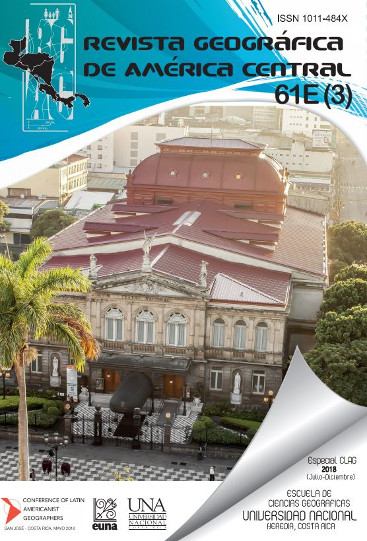The space social construction of the places: a look from the turn special
DOI:
https://doi.org/10.15359/rgac.61-3.29Keywords:
spatial turn, place, urban spatiality, socio-spatial practices, spatial subjectivity.Abstract
The objective of this essay is to relate the contributions of spatial turn and urban spatiality in the socio-spatial construction of places. The traditional conceptualization of space refers to the positivist conception of abstract space, which is transformed in the context of globalization that is accompanied by an epistemological transition. This is where the "spatial turn" proposes a new interpretation of urban spatiality from an interdisciplinary perspective that integrates the material and immaterial dimensions of space and the ways in which they become places. The construction of the place is elaborated from socio-spatial practices and spatial subjectivity; the first refers to the ways of inhabiting the city according to daily activities and the second is understood in social terms and the feelings towards the environment in dialogue between the place and the social actors.
References
Albino, S. y. Barsky, A. (1997). El tercer espacio. Ampliando el horizonte de la imaginación geográfica (Edward Soja). Geographikós, 8 (Segundo Semestre), 71-76.
Augé, M. (2008). Los no lugares: espacios del anonimato. Barcelona: Gedisa.
Bhabha, H. K. (2002). El lugar de la cultura. Buenos Aires, Argentina: Ediciones Manantial.
Berger, J. (1987). Loving a Cold Climate. The Guardian, 4(12).
Boynard, L. M. (2013). Cartografia e a Colonialidade do Poder. Paper presentado en el XIV Encuentro de Geógrafos de América Latina: Reencuentro de saberes territoriales latinoamericanos. Lima, Perú.
De Sousa Santos, B. (2000). Crítica de la razón indolente, contra el desperdicio de la experiencia. Recuperado de http://biblioteca.clacso.edu.ar/Argentina/iigg-uba/20161110024742/Critica.pdf
Escobar, A. (2000). El lugar de la naturaleza y la naturaleza del lugar: ¿globalización o postdesarrollo? Recuperado de http://biblioteca.clacso.edu.ar/clacso/sur-sur/20100708045100/7_escobar.pdf
Foucault, M., y Miskowiec, J. (1986). Of other spaces. Diacritics, 16(1), 22-27.
Harvey, D. (1998). La condición de la posmodernidad: Buenos Aires: Amorrortu.
Hiernaux, D., y Lindón, A. (2004). Desterritorialización y reterritorialización metropolitana: la ciudad de México. Doc. Anàl. Geogr, 44, 71-88. Recuperado de http://www.raco.cat/index.php/DocumentsAnalisi/article/download/31833/180044
Kuri, E. P. (2013). Representaciones y significados en la relación espacio-sociedad: una reflexión teórica. Sociológica, 28(78), 69-98. Recuperado de http://scielo.unam.mx/pdf/soc/v28n78/v28n78a3.pdf
Lefebvre, y Lorea, I. M. (2013). La producción del espacio: Capitán Swing: Madrid.
Lindón, A. (2009). La construcción socioespacial de la ciudad: el sujeto cuerpo y el sujeto sentimiento. Revista Latinoamericana de Estudios sobre Cuerpos, Emociones y Sociedad, 1, 06-20. Recuperado de http://www.relaces.com.ar/index.php/relaces/article/view/4/4
Lindón, A. (2012a). Corporalidades, emociones y espacialidades. Revista Brasileira de Sociologia da Emoção, 11(33), 698-723. Recuperado de http://www.cchla.ufpb.br/rbse/AliciaLindonDos.pdf
Lindón, A. (2012b). La concurrencia de lo espacial y lo social. En, E. Garza y G. Leyva (eds.), Tratado de metodología de las ciencias sociales: perspectivas actuales (pp. 585-622). México: FCE, UAM -Iztapalapa.
Lindón, A. (2017). La ciudad movimiento: cotidianidades, afectividades corporizadas y redes topológicas. Inmediaciones de la Comunicación, 12(1), 107-126.
Löw, M. (2013). O spatial turn: para uma sociologia do espaço. Tempo Social, revista de sociologia da USP, 25(2), 18. Recuperado de http://www.scielo.br/scielo.php?pid=S0103-20702013000200002&script=sci_arttext&tlng=pt
Massey, D. (2013). Pelo espaço: uma nova política de espacialidade (4a ed.). Río de Janeiro, Brasil: Bertrand.
Pérez, D. (2013). Sujeto y subjetividad: entre el discurso hegemónico y el discurso alternativo. Una aproximación al estado de la cuestión. Universidad Nacional.
Rochefort, R. (1963). Géographie sociale et sciences humaines. Bulletin de l'Association de géographes français, 314-315(40), 18-32. Recuperado de http://www.persee.fr/docAsPDF/bagf_0004-5322_1963_num_40_314_5645.pdf
Santoni, M. (2009). Ecosistema urbano-psicología: interacciones espacio-subjetividad. Multequina: Latin American Journal of Natural Resources, 18, 117-127.
Jameson, F. (1991). El posmodernismo o la lógica cultural del capitalismo avanzado. Recuperado de http://cipec.nuevaradio.org/b2-img/jamesonposmodernismo.pdf
Santos, M. (2000). La naturaleza del espacio. Barcelona: Editorial Ariel.
Soja, E. W. (1989). Postmodern geographies: The reassertion of space in critical social theory. London: Verso.
Soto, P. (2011). La Ciudad Pensada, la Ciudad Vivida, la Ciudad Imaginada. Reflexiones teóricas y empíricas. Revista de Estudios de Género, 34, pp. 7-38. Recuperado de http://www.scielo.org.mx/pdf/laven/v4n34/v4n34a3.pdf
Sotolongo, P. C., y Delgado, D. C. (2006). La intersubjetividad social, las estructuras sociales objetivadas y las subjetividades sociales individuales. En, P. L. Sotolongo y C. J. Delgado, La revolución contemporánea del saber y la complejidad social: hacia unas Ciencias Sociales de nuevo tipo (pp. pp. 131-164). Buenos Aires: Consejo Latinoamericano de Ciencias Sociales (CLACSO). Recuperado de http://biblioteca.clacso.edu.ar/ar/libros/campus/soto/sotolongo.pdf.
Tuan, Y.-F., y de Zapata, F. D. (2007). Topofilia: Un estudio de las percepciones, actitudes y valores sobre el entorno. España: Melusina.
Downloads
Published
How to Cite
Issue
Section
License
Proposed policy for journals offering Open Access
Authors publishing their works in the Journal acknowledge and agree to the following terms:
a) Authors retain the copyrights to their works and guarantee the Journal the right to be the first to publish their works, under the Creative Commons License Attribution-NonCommercial-ShareAlike 4.0 International, CC BY-NC-SA 4.0 International (https://creativecommons.org/licenses/by-nc-sa/4.0/deed.es), which allows others to share works upon complying with the acknowledgment of authorship and mention of the Journal as the original publisher of the work.
b) Authors are permitted to separately establish additional agreements for the non-exclusive distribution of the official edition of the work published in the Journal (for example, authors may desire to place the work in an institutional repository or incorporate it into a book that is to published elsewhere) so long they acknowledgment to recognize the Journal as the original publisher. The aforementioned additional agreements must respect the terms of the non-profit character and sharing philosophy of the original license (CC BY-NC-SA 4.0 International, https://creativecommons.org/licenses/by-nc-sa/4.0/deed.es).
c) Authors are encouraged to archive the post-print or editor/PDF version in Open Access repositories.






 REVGEO is licensed under https://creativecommons.org/licenses/by-nc-sa/4.0/deed.es
REVGEO is licensed under https://creativecommons.org/licenses/by-nc-sa/4.0/deed.es
.svg_4.png)

_(1).png)
_(1)_(1)_(1)_1.png)
(2)(1)(1)(1).png)
